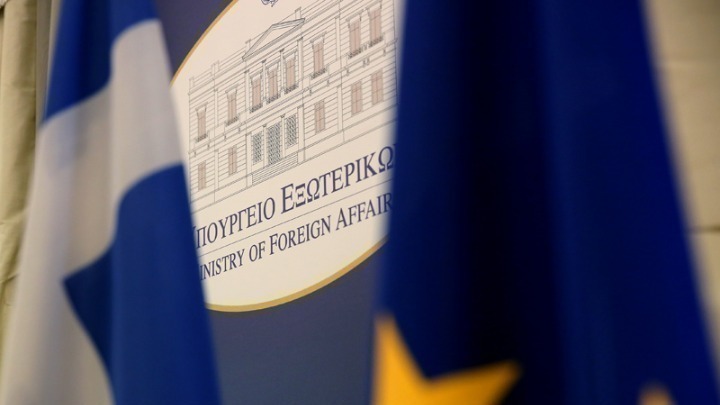Diplomatic sources: Greece will respond to Libya's notes verbales with robust and well-supported legal arguments

Greece will respond to Libya’s notes verbales in the near future with fully supported, robust, and exclusively legal arguments, diplomatic sources said on Tuesday. The same sources emphasised that Greece is already preparing its response with the necessary legal support, while adding that such notes verbales do not produce an immediate effect.
Notwithstanding this, they added, a response does have value because if a legal dispute arises in the future, what has been officially recorded becomes evidence.
“ Therefore, we must be very careful what we write in our response - and we will respond,” the sources stressed. It was also pointed out that Libya’s maps are not consistent with international law. One example of inconsistency is the different treatment of Crete and Malta in terms of the islands generating maritime effects, with the sources pointing out that Crete cannot logically be excluded from the maritime effects recognised as existing for Malta.
The main issue, according to the same sources, stems from the signing of the Turkiye-Libya Memorandum, which lacks any basis in international law, since - regardless of jurisdiction - the two countries do not have opposing coastlines. Thus, they added, it is irrelevant who signs it.
“ The Mediterranean is a highly coveted sea,” the sources noted, adding that when it comes to hydrocarbon exploration - that is, licensing exploration blocks - it becomes clear that no private company will assume a sovereignty-related risk. “ A company of Chevron’s stature would never proceed with exploration unless it had first ensured - through its own due diligence - that it could operate without interference. Therefore it is very important for this to be recorded,” they said.
The sources also confirmed that Libya respects the median line in terms of the exploration blocks in the field, noting that this was positive despite Libya presenting its claims through notes verbales.
On migration, the sources reported a significant increase in migration flows from Eastern Libya, emphasising that Greece will raise the issue at the EU level. They also clarified that the non-completion of the EU mission in Libya was not connected to Greece and that there has been no discussion with Libya about a European or other mission.
Greece is currently the only country engaging at the highest level with both sides in Libya, according to the same sources. “ This entire dialogue is happening because Greece took the initiative. We are not reacting - we are acting,” they said.
“ Greece does not accept any faits accomplis. The Turkiye-Libya memorandum cannot produce any legal effects, and its very existence hinders technical-level discussions,” the sources added.
Greece-Turkiye High-Level Cooperation Council Expected in September
The High-Level Cooperation Council between Greece and Turkiye is expected to take place in September, according to a senior diplomatic source. The same source explained that it could not be organised in July due to a busy schedule with many pressing issues, most notably the Cyprus issue. The same official expressed confidence that the electricity interconnection between Greece and Cyprus will go ahead, while making it clear that there can be no such interconnection between the occupied areas of Cyprus and Turkiye.
Regarding the prospects of EU-Turkiye defence cooperation, the same source noted that Turkiye has upgraded its defence industry, which gives an advantage to any country with such capabilities.
“ However,” the source clarified, “ this does not mean that just anyone can freely participate in European programmes. We will not consent to any agreement with a third country that undermines our national interests.”
Greece, they emphasised, still believes that a channel of communications with Turkiye must remain open.
“ It’s important to remember the 7,000 airspace violations, the chaotic migration flows, and the climate of hostility. We’re under no illusions that we’ll resolve in two years what hasn’t been resolved in decades - but we must be able to manage developments without triggering crises,” they said.
“ Red lines do not change - we’ve known that from the beginning. Lasting peace in the region can only come with a delimitation (of maritime zones). That’s not expected in the immediate future, because there’s a fundamental disagreement about the scope of the discussion. Turkiye sees the issues as interlinked,” the sources concluded.

